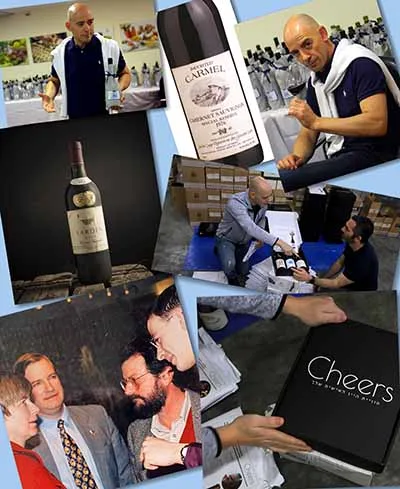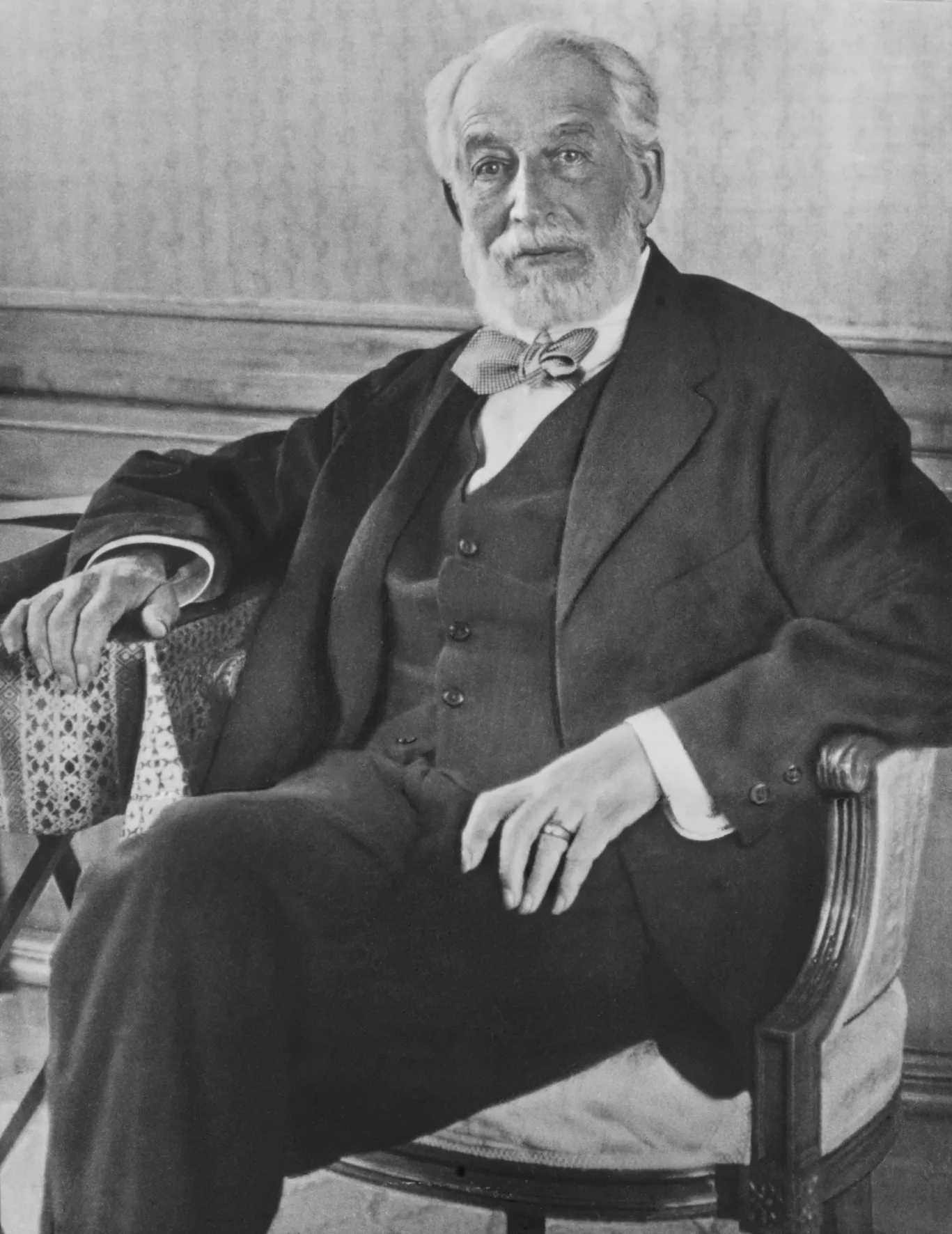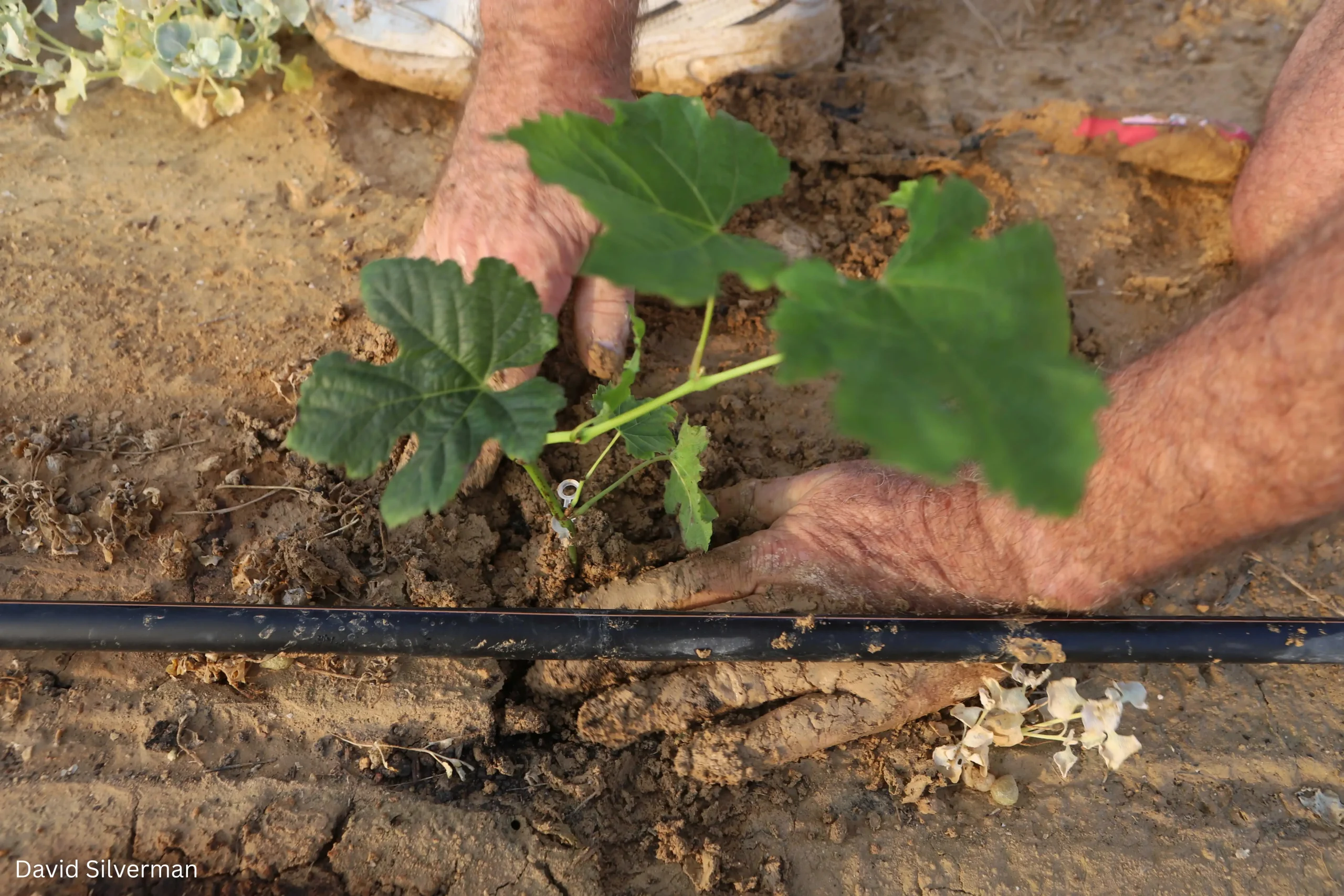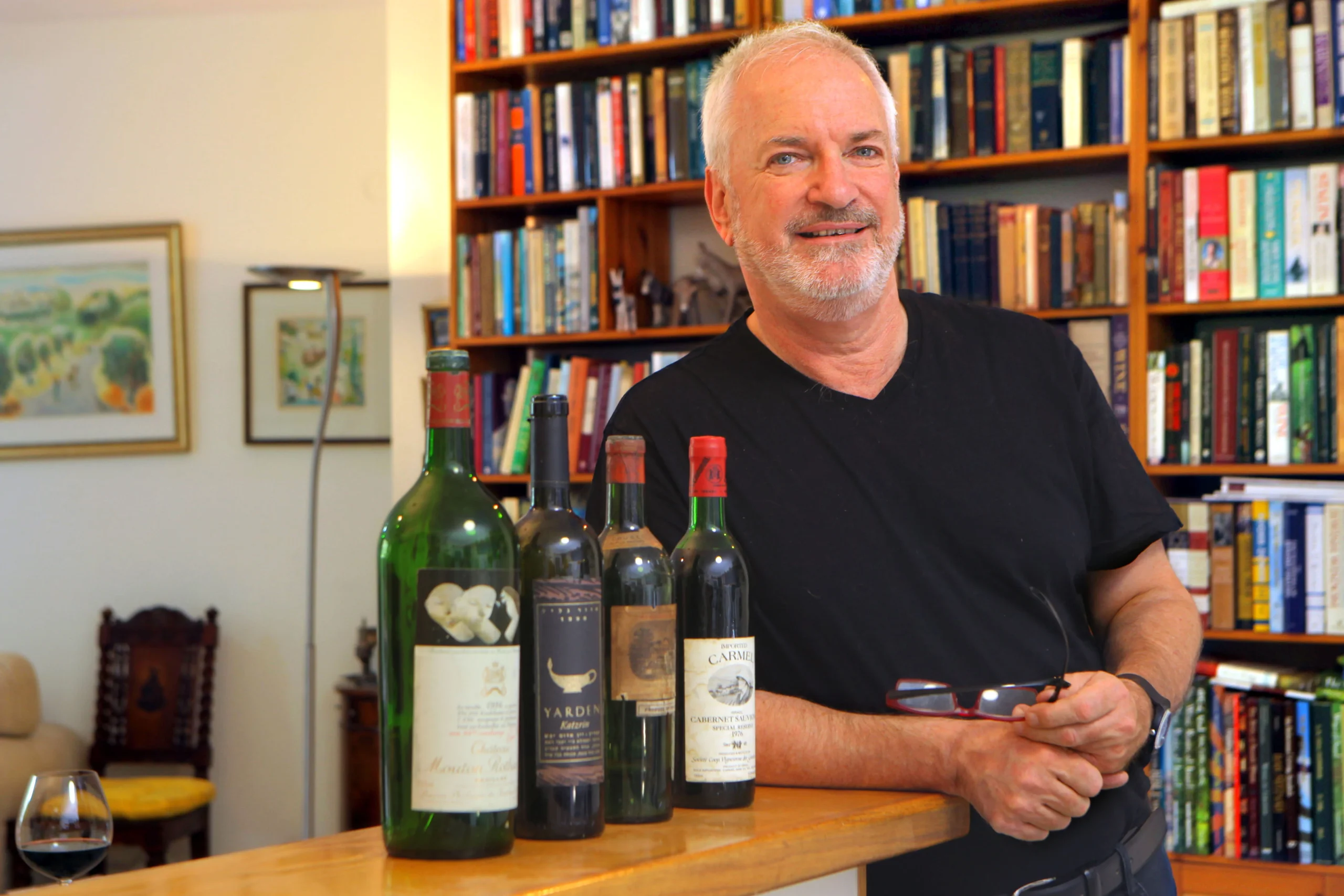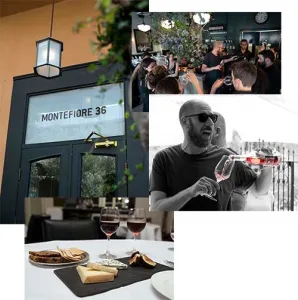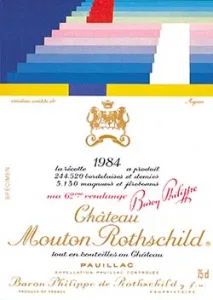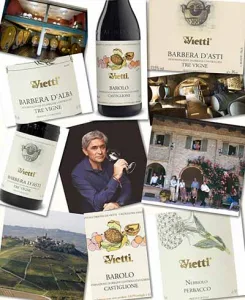He is arguably the number one wine expert in Israel. Yet he is not a winemaker and does not work for a winery. He is neither a sommelier in a restaurant, nor is he a wine critic. However, he has the respect of the entire wine trade, particularly in Israel and Europe, as someone with unique knowledge, understanding and experience.
Paradoxically, none of the many things he has done in the world of wine has contributed to the building of this image. True he has written articles, taught wine, lectured, been on tasting panels…..even written a wine guide book. Yet, uniquely he is not associated with any one thing in particular.
He is famous for being Yair Haidu, more than for his achievements. The person it seems is greater than the sum of his career parts. His image is built on his persona, his character, his knowledge and his manner. The way he uses his strengths and how he interacts with people is why he has arrived at the pinnacle of Israeli wine.
Yair Haidu is also somewhat of an enigma. There should be numerous articles about him, but most of what I found when researching were shallow press releases. In depth articles, peeling the layers of the onion, were simply not there. Therefore, when I met him for an interview, I had my fears that he would be wary about revealing too much of himself. In fact, he was totally open and talked about everything in a very expansive way. I have known him for 25 years, but this time I wanted to scratch beneath the well-polished surface and find out what I did not know. Even though I have been around a long time, I found the discussion fascinating and absorbing. I was writing frantically while he talked. It was rather like a wagon of ripe fruit passing you by, and you grab what you can.
I first met him in 1994. He was then a tour guide with a focus on wine, who led a memorable visit of all the Golan Heights Winery employees to Bordeaux and Cognac. I was then the export manager of the winery. This role of ‘wine tour guide’ combined his love for sharing, his deep store of knowledge and what was for him a growing interest in wine.
He was tall, thin as rake, with cropped spiky hair, round rimmed glasses, and a broad cheek to cheek, post box smile. He was a great raconteur, loved telling a story, was witty, enjoyed a laugh and oh, how he loved to talk ……..but this is not such a bad quality for a tour guide! He was relatively new to wine, but steeped in culture from the cradle, fiercely intelligent with a passion to learn and absorb knowledge. In the army he had served as a tour guide and this was a first career initially only in Israel, then later in France too, all the while graduating more and more towards wine. He was attracted like a moth to a flame.
Segev Yerovam, CEO of Golan Heights Winery, was impressed by his communication skills and enthusiasm. When the Golan Heights Winery wanted to establish a wine school in 1996, Yair Haidu was approached to manage it. If the truth be told, the Israel Wine Academy was not a great success. The idea was ahead of its time and maybe it was too ambitious for a winery to open a wine school, but Yair Haidu used the position to the maximum benefit to establish himself as an impressive figure. He was on the Israeli wine map.
I asked him where his interest in wine came from, and he went back to his childhood, when from the age of 10 he would dissect the ingredients of the dishes cooked by his French mother. He was always acutely aware of tastes and smells. His father was the famous Andre Hajdu, the Hungarian Israeli classical music composer, recipient of the Israeli Prize. Yair, who was bought up as religious, was one of six children. It was a trip to Paris just before the army, that opened a door in his mind regarding wine. He was immediately attracted to the wine culture, the dust on the bottles in dusky cellars, the wine talk, the atmosphere and the people. He began compulsively buying and collecting wine. He remembers purchasing wines like the Yarden Cabernets of 1985/6, Carmel Private Collection 1988 and the Herzl edition from Askalon-Segal.
He studied philosophy at the Hebrew University and thought that an academic career beckoned, possibly focusing on philosophy, art or history, but wine nudged them aside. The wine that really pushed him through the door was a Château Figeac 1959. This was his epiphany wine.
After the Wine Academy, he joined Riedel, as the regional manager for Europe in 2000. Riedel of course is the most famous wine glass company in the world. This opened the doors of the wineries of Europe and established him as figure in the wine world. Yair Haidu began to build an international reputation. He was even selected to participate on the tasting panel of La Revue du Vin, France’s most important wine magazine.
By now well established and universally respected, he worked hard to set up and finance a global lifestyle network called ‘Haidu’ beginning in 2009. It was brilliant in its conception, certainly good in theory, but it disappointingly fell by the wayside without a whimper. The idea was sound, but it did not get through the starting gate. What was significant was the use of the name Haidu as a brand name in its own right.
In 2013, when El Al Airlines wanted to upgrade their wine and food service, they approached Chef Moshe Segev for the food and Yair Haidu for the wine. As such he became their wine manager or sommelier. He selected the wines, trained flight attendants, introduced an innovative ‘wines of the month’ program and wrote informative wine lists, which won awards and gained international recognition. His other major project in the last decade was becoming Brand Director for Nude. This was a line of designer glassware especially created by Haidu on behalf of the Sisecam Group, the major glassware company in Turkey.
When you meet Yair Haidu, he is impeccably dressed, usually smart casual. He may be wearing a tight-fitting blue cardigan, a white shirt, narrow jeans, occasionally with a white scarf or sweater thrown strategically over his shoulders like an ornament. He leans forward with a slight bow of the head when he meets people. He is instinctively friendly, unfailingly courteous, with an old world, European politeness. You almost expect him to click his heels like an Austrian Count when he shakes your hand. He exhibits endless patience unless he confronts a lack of culture, a hint of vulgarity or poor service, when there will be a momentary flash of irritation. The back will straighten, the head will go back, but normally these rare occasions are submerged in a soft duvet of charm and grace.
When talking about wine, his eyes light up and he trawls up from somewhere, memories of tastes of wines from way back. He talks of aromas and flavors, and others merely nod and agree, all the wiser with hindsight. Jeff Morgan of Covenant Winery describes him as a wine impresario: “I have sat down with Yair and was left with the feeling he knew my wines better than I do.” He has an intense curiosity, a prodigious memory, a very well-developed tasting ability, and both the imagination and vocabulary to vocalize it. You want to know about Ben Ami Carignan 1977 from Dir Raffat (“unbelievable”), Carmel Cabernet Sauvignon Special Reserve 1976, from Rishon Le Zion vineyards, (“a magical 10 minutes”), or Yarden Cabernet Sauvignon 1984, then only Haidu has tasted them recently and has the knowledge, experience and perspective to explain and categorize the wine.
It was fascinating to hear him chart the history of Israel’s wine evolution and revolution. He describes the progress this way. The 1970s was the rebirth of Cabernet Sauvignon and the beginning of quality grape varieties. The 1980s represented the move to the mountains and high elevation vineyards. In the 1990s small was beautiful, as the small winery boom began. The 2000s was a decade of international education & qualifications, when numerous young winemakers studied and gained experience abroad, before returning to contribute to Israeli wine. In the 2010s Israeli wine discovered the Mediterranean in terms of varieties and blends. As for the decade beginning now, the 2020s, this will be the era of terroir and authenticity. Giving a sense of place to the wines and matching the variety to the vineyard area.
When I asked about grape varieties, he said these are the least interesting things in the discussion. He used Sancerre and Chablis as examples of regions, where the place and terroir, ends up offering added value over and above the grape variety (respectively Sauvignon Blanc and Chardonnay.) As opposed to New Zealand Sauvignon Blanc and Australian Shiraz where you primarily look for the characteristics of the grape variety. (He qualified himself, explaining there are many regional Australian Shiraz’s today, but was generalizing to make a point.) He went on to explain that Cabernet Sauvignon was a commodity. “A bottle could cost NIS 50 or $5,000. The heritage of place is far more important than the variety.” As for grape varieties, he said they are like musical instruments. It’s what you do with them and how you use them that makes them relevant and interesting. He clarified “Wine should express a site and a person.”
He saluted visionary people like Shimshon Welner, Segev Yerovam, ex CEO’s of the Golan Heights Winery (“in the 1980’s and 90’s the Golan was the most significant locomotive in the wine revolution”), and trail blazers like Yair Margalit, Eli Ben Zaken, and Roni James, respectively of Margalit Winery, Domaine du Castel and Tzora Vineyards. As for favorite wines, he throws out the following names like a shopping list, all from memory. He particularly rates the Yarden Cabernet Sauvignon 1984, Yarden Katzrin 1990 & Yarden Cabernet Sauvignon 1991. From Margalit he picks out the Margalit Cabernet Sauvignon of 1993 and 1994, and the Enigma and Cabernet Franc of 2004. From Castel he most rates the Grand Vin 2000 and the 2016. As regards Tzora Vineyards, where Israel’s only Master of Wine is today the winemaker, he talks about Misty Hills 2011, 2015 and 2018. Regarding whites he mentioned the Tzora Shoresh (“the 2019 is the best yet”) and Kerem Shvo Gershon. There is no-one quite like him for tasting, comparing and remembering.
He lauds the unprecedented talent of today’s winemakers, and praises their ability to work together. Sharing accumulated experience and sharing is a very positive development. He particularly admires winemakers like Gabi Sadan (Kerem Shvo) and Uri Hetz (Chateau Golan) for their curiosity, search for authenticity and for making wine without embellishment. He also greatly respects Eran Pick MW (Tzora), Ido lewinsohn (Barkan), Asaf Paz (Vitkin) and Itai Lahat (both for his Lahat wines and his influence as a consultant.) He explained to me there was a short path to make a good wine, but he prefers the longer path to make a great, more authentic wine.
Yair Haidu’s latest initiative is an innovative, new start up called Cheers. This is a concept designed to sell a ticket to the wine world and to empower the wine drinker. Prospective customers are invited to complete a clever questionnaire, from which Cheers will ascertain their taste profile. They will then select wines, designed to fit the customer’s taste, knowledge and curiosity. At a cost of NIS 350 a month, the customer will receive a surprise gift box of three wines, personally matched to their needs. Along with the wines they will receive an A4 page telling the story of the wine and winery. Yair Haidu sees himself as a story teller, helping the customer navigate this strangely inaccessible world. This is rather like the difference between the old & new sommelier. The old sommelier would recommend a wine (ie. ‘follow me, because I understand’), the new sommelier will question the client and try & find what he is looking for, before making a recommendation. The idea is an ongoing journey of discovery, exploration, entertainment and experience.
His partner is Itay Gleitman, who is relatively new to the business of wine. He is a physiotherapist, who turned into a successful, even talented wine writer, but it is hard to make a living with a pen in hand. He is now the partner in this new initiative. They taste 150 wines a week to find suitable wines in the NIS 110-150 category. “This is a sweet spot where we can find wines to surprise. These are not just wines that we like, but wines we are prepared to stand behind.” Haidu says they are trying to connect with the wine drinker and explains to me the whole concept is geared to those who would love to be part of the wine world, but find themselves as outsiders. “Most people think wine merchants are like lawyers, out to screw you”. He aims to build a bridge, create trust and have an ongoing conversation. Certainly, wine lovers and connoisseurs alike, along with anyone who wants to learn and expand their knowledge, would do well to check out what Cheers is offering.
Haidu is a Liverpool supporter, so is particularly happy these days (as is my son, another fan!) He remains single, but to make up for this, he has no less than 16 nieces and nephews. He feels a burning responsibility to lead a change of how we write about wine. “The way back labels were written in the past is no longer relevant.” Cheers gives him a forum to put his theories into action.
One of the most impressive things about Yair Haidu is that he tastes quietly, with concentrated curiosity in his eyes. He does not boom and pontificate like so many wine experts do, as though giving out pearls of wisdom to the masses, but gives his opinion more like an excited child. ‘This is what I have found’, rather than ‘it tastes like this’. With apologies to Winston Churchill, maybe this wine expert with a Hungarian name is still an enigma, wrapped up in French joie de vivre, blended with Israeli creativity; he remains an outsize character within the cocoon of Israeli wine culture. However, what he has to say and his method of delivery fascinates rather than alienates. If wine is on the menu, his opinion or view is always worth hearing.
Wine trade veteran Adam Montefiore has advanced Israeli wine for nearly 35 years. He is often referred to as the English voice of Israeli wine. He has been the wine writer for the Jerusalem Post, since 2010. www.adammontefiore.com
PHOTOS: David Silverman, DS Images; Eli Ben Zaken; Carmel Winery; Golan Heights Winery


